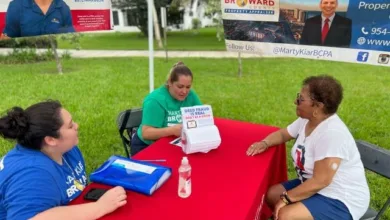Project to help Haitian deportees serves as model for Caribbean
By Eric Green
U.S. planning more programs to help returnees readjust to home countries
WASHINGTON – The United States is looking at expanding to other countries in the Caribbean a U.N.-funded pilot project in Haiti that helps deported Haitians reintegrate into Haitian society.
The one-year U.N. project provides resettlement and reintegration services for the Haitians who have been sent home from the United States and other countries after being convicted and serving their sentences for armed robbery, drug offenses, possession of illegal firearms, murder and other crimes.
The services for the returning Haitians include counseling, vocational training, skills development and micro-credit lending. Haiti is one of the Caribbean’s largest recipients of deportees. Most, but not all, of the deportees are returning from the United States.
The pilot project in Haiti operates with a $1 million grant from the U.N. Development Program to the International Organization for Migration (IOM), which provides support for the Haitian returnees.
ELIMINATING “DEPORTEE” STIGMA
Maureen Achleng, IOM chief of mission in Haiti’s capital of Port-au-Prince, told USINFO that since October 2006 when the pilot project began operating, 350 of 650 deportees to Haiti have registered as participants.
One of the greatest obstacles to the reintegration of Haitian deportees, many of whom have lived away from Haiti for many years, concerns the stigma in Haitian society attached to bearing the label “deportee,” said Achleng.
She said the pilot project seeks to work with Haiti’s government to carry out a nationwide campaign to reduce, if not eliminate, the stigma associated with criminal deportees who widely are perceived as fueling violence. In so doing, the program places emphasis on successful reintegration stories.
Achleng added that IOM hopes to continue the pilot project until February 2008, after which the objective is for the Haitian government to assume control, “although that remains to be seen” because of the weakness of that government.
PLANNING FOR SIMILAR PROGRAMS IN REGION
Charles Shapiro, the State Department’s principal deputy assistant secretary of state for Western Hemisphere affairs, told USINFO August 2 that IOM has a standard practice of providing deportees with HIV/AIDS testing, counseling and micro-loans to help them set up businesses.
Shapiro said the project IOM operates in Haiti is the “sort of thing” the United States is looking at doing in other countries of CARICOM, the 15-nation bloc of Caribbean nations. “Not every comma and period [of the program] will be the same as in Haiti, but it will be similar,” Shapiro said.
Haiti is a member of CARICOM, along with Jamaica, another nation receiving a large number of criminal deportees. The United States is said to be responsible for more than 75 percent of all criminal deportations to the Caribbean region. Canada and Great Britain also are reported to be sending sizable numbers of deportees back to the Caribbean each year.
Shapiro said a similar program formerly run by the United States in Central America ensured that deportees were “not just dumped into airports,” but gave them “a place to spend the night, food and bus fare” to get back to their town or village if they did not live in the capital city.
Shapiro said the program involved the “humanitarian issue” of helping deportees reach their final destinations once they are back in their native land.
ALLEVIATING BURDEN ON SOCIAL SYSTEMS
In congressional testimony on deportees in Latin America and the Caribbean July 24, Shapiro said more than 95 percent of the almost 197,000 deportees from the United States in fiscal year 2006 were sent to Western Hemisphere countries — 115,000 to Mexico alone.
“Clearly, this puts a burden on the societies and the social systems of those countries,” he told the House Foreign Affairs Subcommittee on the Western Hemisphere.
Shapiro said the United States is currently in discussions with CARICOM members “on the next steps and what adaptations may be needed to the (IOM) model program so that it is useful to other nations” in the Caribbean.
Shapiro said aliens who commit crimes or violate immigration law in the United States run the risk of being deported. “The governments of Central America and the Caribbean recognize that it is their obligation to receive their own citizens,” he said.
The deportee issue also was stressed during the Conference on the Caribbean, held June 19-21 in Washington. A U.S.-CARICOM statement said that “we will jointly work toward the expansion of the pilot reintegration program for deportees in Haiti to include other CARICOM member states.”



